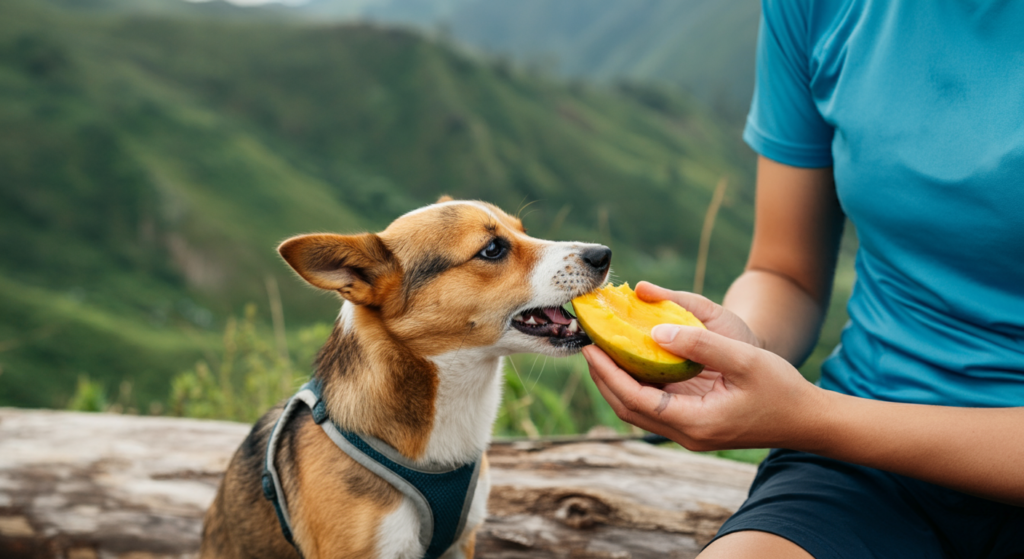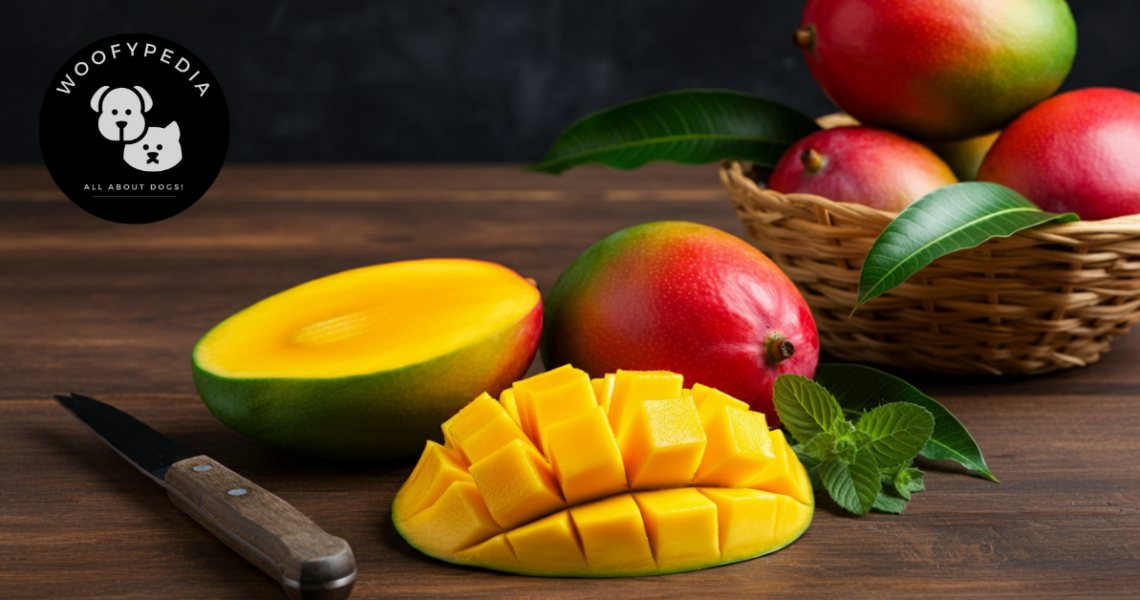Can dogs eat Mango?
Can Dogs Eat Mango? A Sweet Treat or a Risky Bite?
As dog owners, we’re always mindful of what’s safe for our furry friends to consume. With numerous human foods posing potential risks to dogs, it’s only natural to wonder about items we enjoy ourselves. Mango, a tropical fruit beloved for its sweetness and nutrition, often raises the question: “Can dogs eat mango?” While it’s undoubtedly a healthy snack for humans, is it safe for our canine companions? Knowing the facts can help you make informed decisions about sharing this treat with your pet.
Yes, dogs can eat mango, but only under specific conditions. When served peeled, pitted, and in moderation, mango is safe for dogs and may even provide some health benefits. However, not all parts of the mango are dog-friendly. Factors like the pit and the peel are important to consider when deciding whether to offer this tropical treat to your pet. Let’s dive deeper to ensure you’re making the best choice for your dog’s health.
Table of Contents

What Is Mango?
Mango is a sweet, juicy fruit originating from South Asia and now grown in tropical and subtropical regions worldwide. Known as the “king of fruits,” it is rich in vitamins, minerals, and antioxidants. Mangoes come in a variety of sizes and colours, ranging from green to yellow, orange, or red when ripe.
In human cuisine, mango is often enjoyed fresh, dried, or in juices, desserts, and savoury dishes. While it’s a nutritious snack for humans, certain aspects of the fruit need careful consideration before sharing it with your dog.
Can Dogs Eat Mango?
The simple answer is yes, dogs can eat mango, but only in moderation and under certain conditions. When served peeled and pitted, mango can provide health benefits. It’s packed with vitamins and natural sugars, which can be a tasty and nutritious treat for your dog.
However, not all parts of the mango are safe. The pit poses a choking hazard and contains small amounts of cyanide, a toxic substance. The peel, while not toxic, can be tough for dogs to digest and may cause stomach upset.
What Are the Benefits of Mango for Dogs?
Mango, when prepared correctly and offered in moderation, can provide certain benefits to your dog. While not essential to a dog’s diet, this tropical fruit contains nutrients and compounds that may support your pet’s overall health. Here are some potential benefits of mango for dogs:
1. Rich in Vitamins
Mango is loaded with essential vitamins, including:
- Vitamin A: Supports vision, immune health, and skin regeneration.
- Vitamin C: Acts as an antioxidant, boosting immune function and reducing inflammation.
- Vitamin E: Promotes healthy skin and coat.
2. High in Fibre
Mango contains dietary fibre, which can help support healthy digestion. This can be particularly beneficial for dogs prone to constipation or irregular bowel movements.
3. Antioxidant Properties
The antioxidants in mango, such as beta-carotene and polyphenols, help combat free radicals in your dog’s body. This can reduce oxidative stress and support overall well-being.
4. Hydration
With its high water content, mango can be a hydrating snack on hot days, helping your dog stay cool and refreshed.
5. Natural Energy Boost
Mango’s natural sugars provide a quick energy boost, making it a good treat for active dogs.
Are Mangoes Bad for Dogs?
In moderation, mango is not bad for dogs. However, excessive consumption can lead to digestive upset, including diarrhoea or vomiting. Additionally, the pit and peel pose specific risks that must be avoided.
What Are the Dangers of Dogs Eating Mango?
While mango can offer some benefits, it also comes with potential risks that every pet owner should understand before sharing this treat with their furry friend. Here are the key dangers associated with dogs eating mango:
1. Choking Hazard
The mango pit is large, hard, and poses a significant choking hazard, especially for smaller dogs. If swallowed, it can cause:
- Obstruction: The pit may become lodged in the digestive tract, leading to intestinal blockages that may require surgical intervention.
- Dental Damage: Biting down on a hard pit can break or damage a dog’s teeth.
Tip: Always remove the pit before offering mango to your dog.
2. Digestive Issues from the Peel
While the mango peel is not toxic, it is tough and fibrous, making it difficult for dogs to digest. Eating the peel can cause:
- Stomach upset
- Vomiting
- Diarrhoea
Tip: Peel the mango before serving it to your dog.
3. High Sugar Content
Mango is naturally high in sugar, which, while not harmful in small amounts, can lead to:
- Weight gain if fed frequently
- Blood sugar spikes in dogs with diabetes or weight issues
Tip: Offer mango as an occasional treat and in small portions.
4. Potential Allergies
Though rare, some dogs may be allergic to mango. Signs of an allergic reaction include:
- Itching or scratching
- Swelling of the face or paws
- Difficulty breathing
Tip: Introduce mango slowly and monitor your dog for any unusual reactions.

How Many Mangoes Can Dogs Eat?
Portion control is key when feeding mango to dogs. A small dog may only tolerate a few small pieces, while larger breeds might enjoy a few more. Introduce mango gradually to observe any adverse reactions, such as allergic responses or digestive issues.
If your dog shows signs of discomfort after eating mango, consult your veterinarian immediately. They can provide guidance on whether mango is a suitable treat for your specific dog.
Fun Facts About Dogs and Mangoes
- Dogs in tropical regions may encounter mango trees and nibble on fallen fruit. However, the fruit is usually plain and unprocessed.
- Some dogs love the sweet taste of mango, while others may not find it appealing. If your dog loves mango, treat them sparingly!
- Did you know mangoes have been cultivated for over 4,000 years? While dogs don’t need mango, they can enjoy it as an occasional treat.
Conclusion
So, can dogs eat mango? The answer is yes—with precautions. Always serve peeled, pitted, and in moderation. Avoid the pit and peel, and consult your vet if you’re unsure. Remember, your dog’s health and safety come first. Have you tried giving your dog mango? Share your experience below!
Here’s an FAQ based on the topics provided:
Frequently Asked Questions About Dogs and Mango
1. Can dogs eat mango skin?
Mango skin is not toxic to dogs, but it can be tough to digest and may cause gastrointestinal upset. It’s best to peel the mango before offering it to your dog.
2. Can dogs eat mango seeds?
No, dogs should not eat mango seeds. The seed is a choking hazard and contains trace amounts of cyanide, which can be harmful if ingested in large quantities.
3. Can dogs eat parts of the mango tree?
Dogs should not eat the leaves, bark, or any other part of the mango tree. These can be difficult to digest and may cause stomach upset.
4. Can dogs eat pineapple?
Yes, dogs can eat pineapple in moderation. It’s a healthy snack when served fresh, but avoid giving canned pineapple as it contains added sugars.
5. Can dogs eat dried mango?
Dried mango is not toxic, but it is high in sugar and lacks the water content of fresh mango, which can lead to digestive issues. Offer dried mango only in very small amounts, if at all.
6. Can dogs eat mango yoghurt?
Dogs can have plain mango yoghurt as long as it doesn’t contain artificial sweeteners like xylitol, which is toxic to dogs. Always check the ingredients for added sugars or harmful additives.
7. Can dogs eat strawberries?
Yes, dogs can eat strawberries. They’re a great source of vitamins and antioxidants, but serve them in moderation due to their natural sugar content.
8. Can dogs drink mango juice?
It’s not recommended to give dogs mango juice. Most juices contain added sugars and preservatives that can upset your dog’s stomach. Stick to fresh mango instead.
9. Is mango toxic to dogs?
No, mango is not toxic to dogs. When given in moderation and prepared correctly (peeled and without the seed), mango is a safe and healthy treat.
10. How much mango can I give my dog?
A few small chunks of mango are sufficient as an occasional treat. Too much mango can lead to digestive upset due to its high sugar and fibre content.
11. Can dogs eat mango in the UK?
Yes, dogs in the UK can safely eat mango, just as dogs in other parts of the world. Always prepare it properly by removing the skin and seed before serving.
